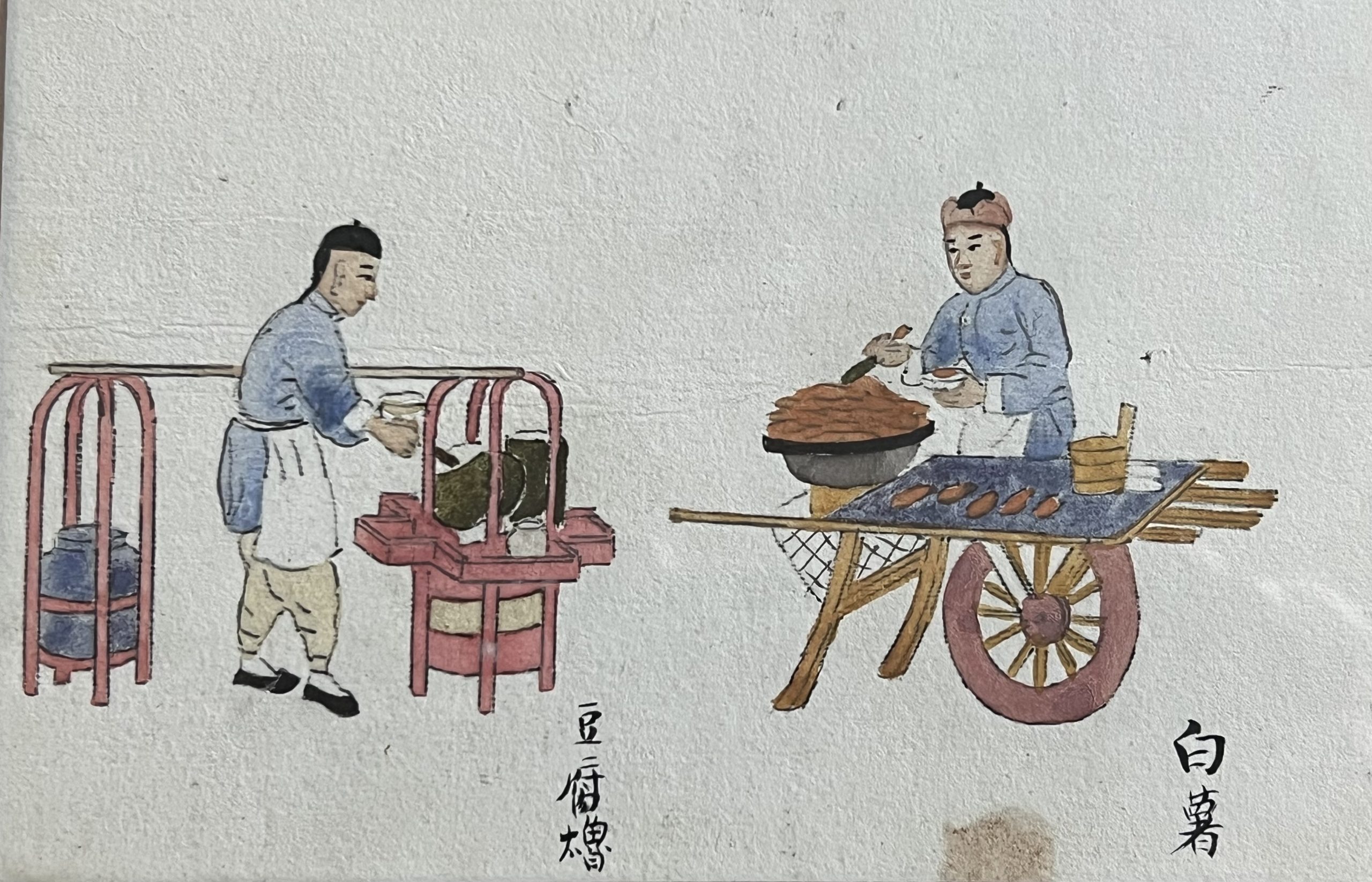
My mother always had a fondness for the scroll of hand-painted figures, dressed in traditional Chinese clothes, carrying produce or hawking other wares. They were framed in pieces and hung on the wall along with other mementoes from her time in Peking (now Beijing) in the late 1940’s. She lived in a neighborhood of classic hutong dwellings, and stayed in the country as long as she could after marrying my father and witnessing the Communist revolution. They both had warm memories of the country and people, including the singsong calls of the street vendors.
My own impressions of China were formed by hearing their stories, as the country was closed tight behind the “bamboo curtain”. The early magazines and propaganda that emerged in the 1960’s portrayed a proud peasant society. I also saw a bit of life in the neighboring country of Vietnam when we lived there in the late 1950’s, which presumably had a few similarities. It wasn’t until 2008 that I visited China myself on an extended eclipse-chasing venture.
Of course, I knew that China was changing dramatically. My parents had returned for a visit in the 1980’s and were pained to see the old hutongs disappearing and the character of the city they knew becoming unrecognizable. China had opened up and was a global economic phenomenon. But I have to admit that my preconceptions died hard.
Landing in Beijing in 2008, I was wasn’t surprised to see the huge modern airport, the freeways, the new buildings, the subway replacing the old walls in a ring around the center. There were still historic buildings and temples, lakes, the Forbidden City. And there were new neighborhoods with art galleries, music venues, bars, and funky stores on side streets. But what would it be like outside of Beijing?
We flew west to Urumqi, on the border of the Xinjiang region (and before mass incarceration of the Uighurs). It was a shock to find a city of many millions at the edge of the Taklamakan desert, on part of the old Silk Road. I quickly learned that there are many cities in China I never heard of, each with millions of people. After battling lots of traffic in from the airport, we were housed in a skyscraper of a Sheraton hotel, more luxurious than any I had ever stayed in. The floor to ceiling windows looked down on a commercial area on a busy street with maybe six lanes of traffic.
There were a few tasks to deal with outside of the tour—including a pair of broken glasses. We spied an optometry storefront across the street; the sign with a big pair of glasses helped. We figured out how to get an exam and new pair on the spot despite no common language, using fingers to point in the direction of the eye chart “E” icons. Amazing!
What was more amazing was the route to and from the store. There was no hope of crossing at street level, but there was an underground passage with stores, similar to some subway stations. On the way back to the hotel, just before the stairs back to street level, I noticed an entrance to what looked like a food store, and poked my head in. It was a revelation.
An enormous and brightly-lit room, replete with broad aisles lined with shelves and refrigeration units, stretched as far as I could see. It was a supermarket. A vast, hidden underground wonder. We wandered through the acres of offerings—mysterious bags and cans of neatly stacked and labelled foodstuffs that dwarfed anything at home. People shopped with carts in an unhurried and spacious atmosphere. No farmer’s market, no people calling out, no live animals, no crowding, lots of variety. This was definitely not my parents’ China.
Maybe the underground supermarket is a regular thing—we found a smaller (but still huge) one when we were back in Beijing and were looking for “numbing spice”, which a friendly fellow shopper helped identify through creative pantomime. Surely more traditional markets and street food persist somewhere, but just as surely the supermarkets have come to stay.
In the meantime, the traditional street vendors can be found in the pictures on my wall, reminding me of my mother.


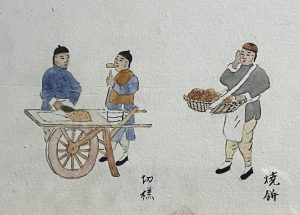
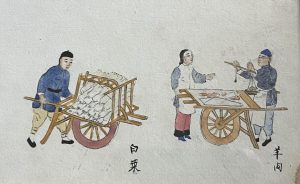
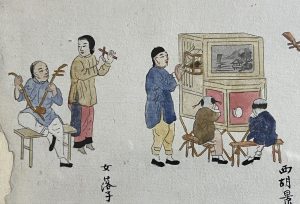
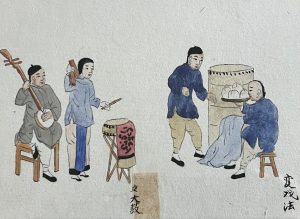

Thanx Khati. Once again your wonderfully written story conjures up a part of the world I haven’t seen, and after your description of a time and place, you bring it home with a warm family memory – your mother’s coveted prints now hanging on your own walls.
Lovely.
Thanks Dana. And once again the prompts take me to places and memories I might not have noticed otherwise.
What a wonderful description of discovering an underground supermarket in an obscure city in China! As Dana says, a part of the world I haven’t seen, except through your eyes. And speaking of eyes, the visit to the optometrist was incredible as well – getting an eye exam and a new pair of glasses without a common language. You have had the most amazing life experiences of anyone I know! So glad that Retro prompts are jogging all those memories loose.
Thanks Suzy. And yes, that optometry visit was a trip, as was getting my digital camera fixed in the same city—it had jammed—and we found there was a Canon repair shop nearby(!). Cab ride out (with written address from hotel) and pantomime resulted in the guy fixing it in an hour while we waited. So many surprises. Sometimes the most interesting things happen when you are not being a tourist, just trying to find your way around with mundane tasks.